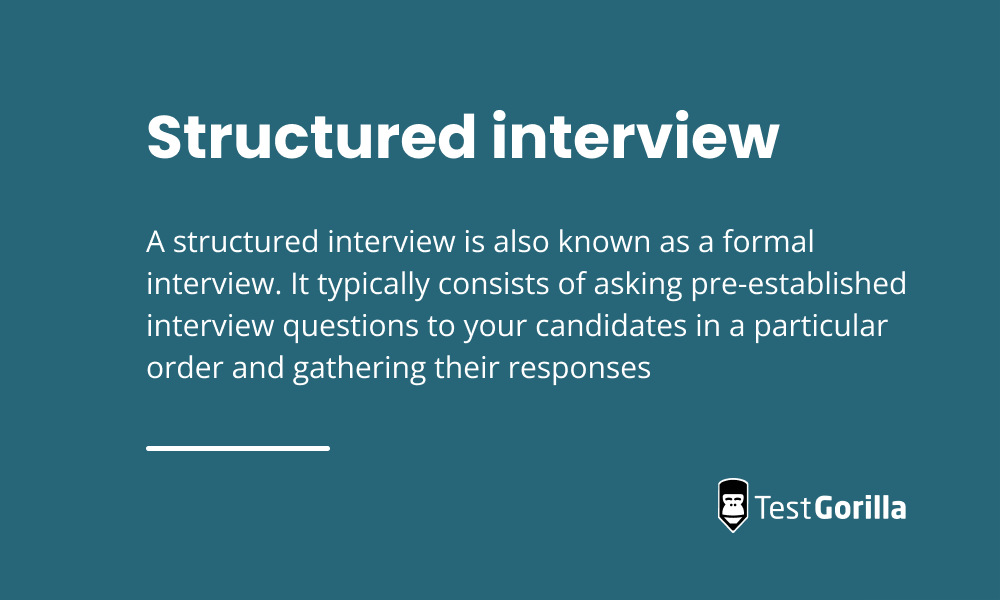Did you know that 74 percent of employers have made a bad hire? That’s right, 74 percent. One of the contributing factors that lead employers to make a bad hire is their interview process. We hope you’re not one of the 74 percent who have made a bad hire and that your interview process hasn’t become predictable and ineffective.
But, to be certain you’re hiring candidates who are the best fit and have the ideal skills for your vacancy, the key is to enhance your interviews. To that end, this guide outlines how you can make your interview process more effective. We’ve also included an interview guide template to help you get started.
Table of contents
- What is a structured interview?
- What is an unstructured interview?
- Key advantages and disadvantages of unstructured interviews
- 5 reasons structured interviews are ideal for assessing candidates
- What are the best practices for creating structured interview questions?
- What are some best practices to use before a structured interview with candidates?
- Interview guide template for structured interview
- How skills tests help enhance the recruitment process after the interview
- General skills to test
- Evaluate your candidates better with structured interviews
What is a structured interview?
A structured interview is also known as a formal interview. It typically consists of asking pre-established interview questions to your candidates in a particular order and gathering their responses. Once you’ve gathered their responses, you would score them using a system you’ve created beforehand.
Structured interviews fall into two broad categories. These categories include structured behavioral interviews and structured situational interviews. If you’re unfamiliar with each of these, we’ve covered them below and included a few sample questions in our interview guide template further down, which you can explore in more detail.
Structured behavioral interview
A structured behavioral interview normally involves learning about your candidates’ past experiences by asking them to give specific examples related to their behavior, aptitudes, and skills in certain contexts.
When conducting a structured behavioral interview, you should be looking for specific evidence that demonstrates your candidate’s ability to deal with certain responsibilities and how they behaved when doing so.
Structured situational interview
Structured situational interviews are similar in many ways to behavioral interviews. But they differ in the sense that you might ask your candidates hypothetical questions about how they would handle a certain situation. Your candidates will have to respond to particular situations they would find themselves in when working for your organization.
In behavioral and situational interviews, you should ask questions related to the skills required for the position, which might involve using open-ended questions to get the most information from your candidates.
You will also need to stick to the questions you’ve come up with, which might seem a little confining, but our interview guide template will help you develop good ideas for this.
What is an unstructured interview?
Where structured interviews follow a certain format, unstructured interviews don’t have a particular structure. So, if you’re preparing an unstructured interview, there’s no need to stick to the script. For this reason, unstructured interviews might seem like an informal dialogue between you and your candidate.
Some typical questions you might ask in an unstructured interview include:
Tell me more about yourself.
What would be your ideal job?
What is your greatest strength?
What is your greatest weakness?
What is your best achievement?
Key advantages and disadvantages of unstructured interviews
With structured and unstructured interviews, you’ll find that they have advantages and disadvantages. Bear in mind that structured interviews have many more advantages than unstructured ones, but you might still go ahead with an unstructured interview if:
You want to offer a ‘relaxed’ interview environment to gain deeper responses to your questions, and
You require qualitative data to get to know your candidates more.
On the other hand, you might prefer to carry out a structured interview because there are some disadvantages to unstructured interviews – such as:
They take a lot more time than structured interviews. They’re more time-consuming because your questions don’t follow any pattern, are unprepared, and yield longer answers from your interviewees.
They require experienced HR staff to carry out – which means that if you’re unfamiliar with how to carry out unstructured interviews, you might require more training.
Their results might be more subjective compared with structured interviews.
And subjectivity can lead to interview bias, which can hinder the recruitment process.
So, although you can back up an unstructured interview with a reliable skills test to ensure your candidates have the top skills, structured interviews might give you more valuable results.
5 reasons structured interviews are ideal for assessing candidates
If you’re new to recruitment and are still unsure whether to proceed with a structured or an unstructured interview, there are various reasons why structured interviews are the best choice for candidate assessment.
As well as helping to reduce your overall cost per hire, here are five other reasons why structured interviews are ideal for assessing and getting to know your candidates.
As candidate assessment should be a level playing field, being objective is essential during the hiring process. Structured interviews eliminate subjectivity as you’ll ask all of your candidates the same questions.
It’s easier for HR staff to compare data across candidates with structured interviews. This is because it’s simpler to use a scoring system to filter your candidates with a structured interview approach as each question is the same for all candidates.
They are much quicker to conduct – which means you can carry out many interviews in a short amount of time. (Take a look at our interview guide template below to find out the length of the list of questions).
They’re beneficial for candidates and enhance the candidate experience as they know they are being judged on their skills.
They comply with labor laws.
What are the best practices for creating structured interview questions?
Next on your list is to write and create your interview questions. If you’ve decided to choose a structured interview approach for your hiring process, here are a few steps that might make it simpler:
First things first – the job analysis. A job analysis consists of systematically gathering details on your vacancy. This also includes which skills are required and the responsibilities and duties expected of your successful candidate.
You’ll then need to create your questions and include a few follow-up questions – (follow-up questions are a great way to consolidate what you’ve learned about your candidates or help get your candidates to express their answers more clearly).
Once you’ve created your questions, your next step is to consider which criteria you’ll use when assessing your candidates’ responses – (you might use a points system, for instance, which will help you grade which candidates gave strong responses and which gave weaker ones)
What are some best practices to use before a structured interview with candidates?
You’ve now prepared your interview questions for your structured interview, but how can you ensure the interview goes smoothly? We’ve put together some best practices to help you make sure you get the best out of your candidates. The first step is to…
…Put your candidates at ease. As it’s normal for job-seekers to feel stressed or intimidated during an interview. And putting them at ease will help to enhance the answers you get from them.
Let your candidates know what to expect during the interview. For example, if you’ll be taking notes, let your candidates know beforehand.
Begin the interview and ask your prepared questions – (taking notes can make it easier to review or assess your interviewee’s responses).
Conclude the interview with courtesy – (let your candidates know when they will hear back from you and thank them for their time).
Interview guide template for structured interview
As promised, here is our interview guide template. It features the key steps to take beforehand and some sample questions you can ask during the interview. Use it and customize it to help enhance your interview process.
Step 1 – As mentioned, conduct a job analysis and create an accurate job description.
Step 2 – Create your interview questions to ask, and determine the order in which you’ll ask your questions.
Step 3 – Create your metrics or scoring system to help you evaluate your responses.
Step 4 – Conduct an application review to narrow down your list of applicants.
Step 5 – Give your candidates a test relevant to the particular role.
Step 6 – Carry out the interview and stick to your list of questions.
Step 7 – Evaluate your candidates’ responses using your scoring system and decide whether they should advance to the next round of interviews.
Some questions you might ask during the structured interview itself include:
Explain which approach you would take to overcome [a challenge expected within the role].
Could you provide an example of when you used [a particular skill] and achieved positive results?
How will you make an impact at [your company name]?
How do you define success, and how would you measure it for [particular vacancy]?
Can you identify a moment where you overcame a mistake in your previous role? What did you do to solve the issue?
Can you describe a situation where you had to adapt to change? How did you go about it?
How skills tests help enhance the recruitment process after the interview
Even if you chose to use a structured interview approach, there’s always a chance that you’ll attract seasoned interviewees that might not always be the best fit for the position.
Bear in mind that some candidates might have memorized the answers to your structured interview questions. So, for these reasons, a skills test for the specific position you’re hiring for is vital.
Skills tests can help with this. Here’s why:
We mentioned that being subjective can hinder the interview process. With an online skills assessment, you’ll ensure that you’re always objective when evaluating your candidates, as you can base your decisions on their skills and aptitudes.
TestGorilla is also a fast way to narrow down your candidates. You’ll easily be able to filter your candidates and ensure that you only interview qualified applicants.
Reliable skills testing platforms are frequently enhanced and improved. In addition, they are backed by experts in their respective fields, meaning their skills tests are ideal for a range of vacancies and roles. For example, TestGorilla’s tests are created and validated by experts. We then continue to track the tests to see whether adjustments need to be made.
Skills testing platforms can enhance the candidate experience. They signal to your candidates that your hiring process is a level playing field and can motivate them to perform well.
Ideally, you’ll conduct a skills test before the interview process. Since interviews are resource-intensive and it’s important to focus that time on the most qualified candidates, ensuring that you only interview candidates with the skills you need will dramatically improve your hiring efficiency.
General skills to test
TestGorilla has a library of over 125 tests, many of them focusing on specific skills like:
But there are many cognitive ability and situational judgment tests that provide valuable insight into a candidate’s aptitude for a wide range of roles. For example:
Verbal reasoning. Our verbal reasoning test is suited for any role that requires good use of language and reasoning.
Critical thinking. Our critical thinking test is suited for any role that involves a high degree of critical and independent thinking to solve complex problems.
Problem solving. Our problem solving test is suited for any role that involves managing constantly shifting variables with tight deadlines.
Communication. Our communication test is suited for any role that requires good communication skills to facilitate effective collaboration with others.
Time management. As you might have guessed from the name, our time management test is suited for any role that requires good time management skills.
Evaluate your candidates better with structured interviews
Hiring top talent requires an exceptional interview process, which might be a bit of a challenge to put together. But, by referring to our interview guide template, you won’t miss anything out. Remember to:
Carry out a job analysis first,
Stick to your list of questions, and
Use best practices to ensure the interview goes smoothly.
As soon as the interview’s over (or beforehand), start looking at reliable skills testing platforms like TestGorilla to ensure your candidates have the best skills for the job!
Related posts
Hire the best candidates with TestGorilla
Create pre-employment assessments in minutes to screen candidates, save time, and hire the best talent.
Latest posts
The best advice in pre-employment testing, in your inbox.
No spam. Unsubscribe at any time.

Hire the best. No bias. No stress.
Our screening tests identify the best candidates and make your hiring decisions faster, easier, and bias-free.
Free resources
This checklist covers key features you should look for when choosing a skills testing platform
This resource will help you develop an onboarding checklist for new hires.
How to assess your candidates' attention to detail.
Learn how to get human resources certified through HRCI or SHRM.
Learn how you can improve the level of talent at your company.
Learn how CapitalT reduced hiring bias with online skills assessments.
Learn how to make the resume process more efficient and more effective.
Improve your hiring strategy with these 7 critical recruitment metrics.
Learn how Sukhi decreased time spent reviewing resumes by 83%!
Hire more efficiently with these hacks that 99% of recruiters aren't using.
Make a business case for diversity and inclusion initiatives with this data.





















